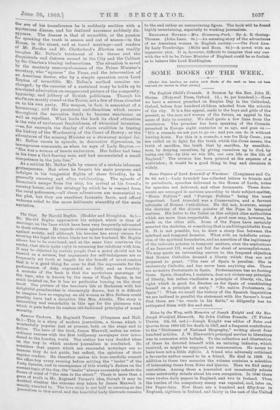Some Papers of Lore Arundel! of Wardour. (Longmans and Co.
8s. 6d. net,)—Lady Arundell has collected letters to friends and to periodicals, speeches delivered in the House of Lords, notes for speeches not delivered, and other documents. These docu- ments are arrinigne in sections according to their subject-matter, "Home Politics" and "Foreign Politics" being the most important. Lord Arundell was a Conservative, and a fervent advocate of Roman Catholicism. Ho did not, however, accept the doctrine of the directs potestas of the Pope in temporal matters. His letter to the Tablet on this subject cites authorities which are more than respectable. A good case may, however, be made on the other side. Some of the Popes have certainly assorted the doctrine, or something that is undistinguisheble from it. It is not possible, too, to draw a sharp lino between the spiritual and temporal domains. What with an indefinite exten- sion of the spiritual boundaries, and an assertion of the legitimacy of the indirecta potestas in temporal matters, even the aspirations of an Innocent III. would not fall far short of accomplishment. We may quote an interesting answer to the frequent objection that Roman Catholics demand a liberty which they are not prepared to grant.. "The case of Spain is peculiar. She is exclusively Catholic, and has never been anything else. There are no native Protestants in Spain. Protestantism has no footing there. Spain, therefore, I maintain, does not violate any principle of liberty, but rather vindicates a principle of liberty, viz., the right which is good for Sweden as for Spain of constituting herself on a principle of unity." "No native Protestants in Spain " I When wo recall the history of the Spanish Inquisition we are inclined to parallel the statement with the farmer's boast that there are "no weeds in his fields," so diligently has ho extirpated them with fire and etoel.


























































 Previous page
Previous page